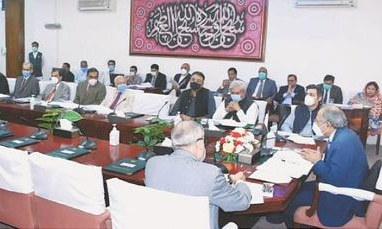ISLAMABAD: A parliamentary panel refused on Monday to approve two bills proposing blanket powers for government functionaries to impose surcharges on electricity consumption and powers for police to arrest consumers for theft.
A ruling party parliamentarian from Karachi walked out of the meeting in protest over rules that stop parliament from holding K-Electric accountable for the city’s misery.
The meeting of the National Assembly’s Standing Committee on Power, presided over by MNA Chaudhry Salik Hussain, saw an exchange of political point-scoring between Energy Minister Omar Ayub Khan and PPP’s Shazia Marri over rising circular debt.
Among other things, the proposed bill seeking amendment to Nepra Act (The Regulation of Generation, Transmission, Distribution of Electric Power Amendment Bill 2020) was opposed by members and the chairman over blanket powers to impose surcharges.
Under the existing Nepra law, the government has powers to impose surcharges from time to time to raise money for any public sector project to the extent decided by the federal government.
The proposed amendment envisaged vesting the federal government with powers to impose surcharge to raise funding to the extent decided by the government for any public sector project as well as for any other purpose.
PTI legislator protests rules exempting KE from parliamentary oversight
As members criticised the bill, the chairman ruled that the committee would not pass it unless it was spelt out who would be bound to pay it, where it would be spent, which authority would keep such funds and how much would be collected.
Minister Omar Ayub said the surcharge was required to cover the cost of financing and circular debt through taxes in the budget if the collection of the required amount was not practicable through specific surcharges.
He said a major portion of about Rs1 trillion circular debt had developed during the previous governments due to un-budgeted subsidies. He said that Rs229 billion, out of Rs450bn blocked by the PML-N government before elections, had been passed on to consumers through Nepra’s adjustments.
He said the PTI government was able through various measures, including the above-mentioned Rs229bn tariff adjustment, to bring down the monthly accumulation in circular debt to Rs12-14bn, but the outbreak of Covid-19 made it difficult to implement further tariff increases.
He said the previous government had kept the exchange rate artificially frozen and this had a significant impact on power tariff.
Shazia Marri of the Peoples Party said it was surprising to hear from a ruling party in its third year in office that it did not have a plan to address challenges it inherited when it came to power. “This is unacceptable.”
Mr Ayub hit back by accusing the PPP of “pumping inflation into the system” by raising the minimum support price for wheat by 300 per cent when it was in power.
The committee asked Nepra to spell out the procedure for determination of tariff in writing.
The minister informed the committee that un-budgeted subsidies in circular debt were a major source of worry for the government. The matter must be addressed through uniform tariff and by giving the power of collecting surcharge from the consumer to distribution companies.
The chairman said the ministry should submit a plan for managing circular debt to the standing committee, observing that the imposition of a surcharge through legislation was unjustified.
The bill was also deferred for the next scheduled meeting.
Energy Minister Omar Ayub told the committee that his ministry was doing its best to control power theft in far-flung areas in a systematic manner. “An anti-theft drive has been going on for the past two years.”
“The Pakistan Penal Code (Amendment) Bill, 2020” will authorise officers in Grade-17 and above to take cognisance of an offence. The minister stressed that the provincial governments should also play their part in curbing power theft.
The chairman appreciated the intent of the bill, but deferred it for the next meeting on the request of the members.
Saifur Rehman, a PTI member from Karachi, walked out of the meeting, complaining that officials from across the country were attending the standing committee meetings, but matters related to K-Electric remained unattended as the energy ministry was trying to distance itself from the responsibility.
With a touch of sarcasm, he suggested that the members from Karachi be excluded from the committee if their concerns and questions cannot be heard.
Published in Dawn, October 20th, 2020















































Dear visitor, the comments section is undergoing an overhaul and will return soon.